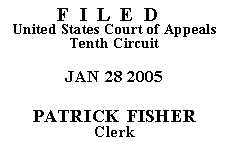

| UNITED STATES OF AMERICA, |
|
| v. | |
| RONALD PAUL MCALLISTER, |
|
Ronald McAllister pleaded guilty to one count of bank robbery on March 5, 2004. Mr. McAllister appeals from this conviction and sentence. Mr. McAllister's counsel filed a brief pursuant to Anders v. California, 386 U.S. 738 (1967), and moves for leave to withdraw as counsel. For the reasons set out below, we grant counsel's motion to withdraw and dismiss the appeal.
Before sentencing, Mr. McAllister filed a motion for a downward departure based on duress, United States Sentencing Guidelines § 5K2.12, and poor health, id. § 5H1.4. No objection to the presentence report was made. After a hearing at which Mr. McAllister presented testimony in support of the motion, the district court denied the downward departure motion. The district court followed the presentence report's recommendation and arrived at a total offense level of 21, a criminal history level of VI, and a sentencing range of 77-96 months. The court sentenced Mr. McAllister to 84 months' imprisonment, to be followed by three years of supervised release.
Anders holds that if counsel finds a case to be wholly frivolous after conscientious examination, he may advise the court and request permission to withdraw. Counsel must also submit to both the court and his client a brief referring to anything in the record arguably supportive of the appeal. The client may then raise any point he chooses, and the court thereafter undertakes a complete examination of all proceedings and decides whether the appeal is in fact frivolous. If it so finds, it may grant counsel's request to withdraw and dismiss the appeal. See Anders, 386 U.S. at 744.
The certificate of service indicates that Mr. McAllister has been served with the brief and motion. He did not file a response to the Anders brief and the government did not file an answer brief. We grant leave to withdraw and affirm the conviction.
In the Anders brief, counsel notes that there are no viable issues for appeal. First, there is no error within the waiver of trial rights and entry of the guilty plea. Next, there is no fault with the guidelines sentencing range, and the sentence was within that range and thus cannot be appealed. Third, pursuant to United States v. Castillo, 140 F.3d 874, 887 (10th Cir. 1998), the denial of defense counsel's motion for downward departure is not appealable. The district court ruled that "the facts adduced here today simply don't support a downward departure in this case." Rec. vol. IV, at 40-41 (Sentencing Hr'g, dated June 17, 2004). The district court did not rule that it lacked the discretion to grant a departure; it recognized it had the authority to so depart. See Castillo, 140 F.3d at 887 (noting "very rare circumstance[s]" where "courts of appeals [] exercise jurisdiction to review a sentencing court's refusal to depart" and recognizing that "[t]his exception does not apply when a sentencing court concludes under the defendant's particular circumstances that it does not have the authority to depart"). Finally, there exists no viable argument in light of the recent Supreme Court holding in Blakely v. Washington, 124 S. Ct. 2531 (2004).
We have carefully examined the record to ascertain whether any other ground exists to support a challenge to defendant's sentence. During the plea colloquy, the district court informed Mr. McAllister about the consequences of entering the plea. Mr. McAllister responded that he understood the plea agreement and that he entered into the agreement voluntarily. We see nothing in the record to indicate that his guilty plea was not knowing and voluntary, nor do we discern any error in the district court's acceptance of the plea or in the terms of the plea agreement. Moreover, Mr. McAllister was sentenced within statutory limits. Hence, there are no sentencing issues for appeal.
Furthermore, we find nothing in the record to indicate that the sentence imposed was in violation of the law or the result of a misapplication of the sentencing guidelines. We also agree that no Blakely issues are present. After careful review of the entire proceedings, we agree with counsel that no non-frivolous grounds for appeal appear on this record.
Accordingly, we GRANT counsel's request to withdraw and we DISMISS the appeal.
Entered for the Court,
Robert H. Henry
Circuit Judge
*. This order and judgment is not binding precedent, except under the doctrines of law of the case, res judicata, and collateral estoppel. The court generally disfavors the citation of orders and judgments; nevertheless, an order and judgment may be cited under the terms and conditions of 10th Cir. R. 36.3.